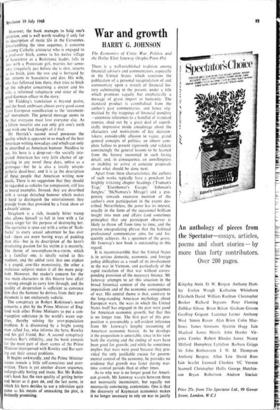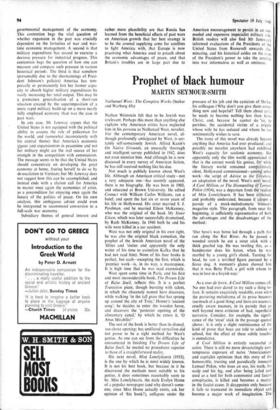The Economics of Crisis: War, Politics. and the Dollar Eliot
Janeway (Staples Press 45s)
War and growth
HARRY G. JOHNSON
There is a well-established tradition among financial advisers and commentators, especially in the United States, which sanctions the publication of a personal recapitulation of and commentary upon a stretch of financial his- tory culminating in the present, under a title which promises vaguely but emphatically a message of grave import to humanity. The standard product is cannibalised from the author's past commentaries, and hence stig- matised by the trappings of financial punditry —extensive references to a handful of standard sources, eked out by a great deal of superfi-
cially impressive inside anecdotage about the characters and motivations of key decision- takers; considerable allusion to vague, grand general concepts of politics; an almost com- plete failure to present rigorously and validate convincingly the general lessons to be learned from the history recounted in such loving detail; and, in consequence, an unwillingness or inability to arrive at concrete proposals about what should be done next.
Apart from these characteristics, the authors of such works typically have a penchant for brightly irritating chapter headings ('Truman's Trap,' Eisenhower's Escape,' Johnson's Jungles,' McNamara's Mirage) and a pro- pensity towards excessive mention of the author's own participation in the events des- cribed. Nevertheless, the genre has its interest, usually in the form of the occasional brilliant insight into men and affairs (and sometimes principles) that any participant observer is likely to throw off from time to time, and the precise encapsulating phrase that the habitual professional commentator aims for and fre- quently achieves. As a specimen of the genre, Mr Janeway's new book is outstanding in this regard.
It is incontrovertible that the United States is in serious domestic, economic, and foreign policy difficulties as a result of its involvement in the war in Vietnam, and particularly of the rapid escalation of that war without corres- ponding provision of the necessary finance. Mr Janeway attempts to set this situation in the broad historical context of the economics of imperialism and of the economic consequences of war. His central theme is that, contrary to the long-standing American mythology about European wars, the wars in which the United States itself has engaged in the past were good for American economic growth; but that this is no longer true. The first part of this pro- position is presumably a self-evident inference from Mr Janeway's lengthy recounting of American economic history. As he develops it the proposition is untestable, since in his view both the starting and the ending of wars have been good for growth; and while he sometimes implies that wars were good because they pro- vided the only justifiable excuse for govern- mental control of the economy, he provides no evidence that growth was faster during war- time control periods than at other times.
As to why war is no longer good for Ameri- can growth, Mr Janeway wavers between three not necessarily inconsistent, but equally not necessarily convincing, contentions. One is that the discovery of Keynesian economics makes it no longer necessary to rely on war to justify governmental management of the economy. This contention begs the vital question of whether expansion in the past was crucially dependent on the fortuities of war and war- time economic management. A second is that military expenditure has ceased to -exercise a decisive pressure for industrial progress. This contention begs the question of how one can measure and compare such pressure in various historical periods. The third is that somehow (presumably due to the shortcomings of Presi- dent Johnson's policies) America has tem- porarily or permanently lost her former capa- city to absorb higher military expenditures by vastly increasing her total output. This may be a premature generalisation of a short-run situation created by the superimposition of a more rapid military build-up on a more nearly fully employed economy than was the case in past wars.
In any case, Mr Janeway argues that the United States is not equipped with the political ability to assume the role of policeman for the world, and (somewhat inconsistently with his central theme) that America's economic xigour and expansionism in peacetime and not her military might are the real source of her strength in the competition with communism. The message seems to be that the United States should concentrate on developing the great economy at home, freeing herself to do so by de-escalation in Vietnam; but Mr Janeway does not suggest how this can be accomplished, and instead ends with a clarion call for America to master once again the economics of crisis, as a precondition for enjoying once again the luxury of the politics of peace. On his own analysis, this ambiguous advice -could even be interpreted to recommend conversion to a full-scale war economy.
Subsidiary themes of general interest and rather. more plausibility are that Russia has learned from the beneficial effects of past wars on American growth that her best strategy is to be the arsenal supplying arms for satellites to fight America with, that Europe is now practising what America used to preach about the economic advantages of peace, and that Britain's troubles are in large part due to American encouragement to persist in an out- moded and expensive imperialist military role. British readers will also find Mr Janeways informed evaluations of the Presidents of the United States from Roosevelt onwards illu- minating, and his historical asides on the issue of the President's power to take the country into war informative as well as ominous.







































 Previous page
Previous page